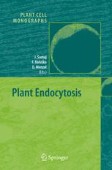Search
Search Results
-
Regulation of S Phase
Regulation of DNA replication is critical for accurate and timely dissemination of genomic material to daughter cells. The cell uses a variety of...
-
Systems biology of apoptosis
New approaches are required for the mathematical modelling and system identification of complex signal transduction networks, which are characterized...
-
Functions of Rab GTPases in organelle biogenesis
Rab GTPases regulate diverse aspects of the biogenesis of secretory and endocytic organelles. The conformational changes that accompany GTP binding...
-
Histone Ubiquitylation and the Regulation of Transcription
The small (76 amino acids) and highly conserved ubiquitin protein plays key roles in the physiology of eukaryotic cells. Protein ubiquitylation...
-
The Generation and Recognition of Histone Methylation
The posttranslational modification of histone proteins via methylation has important functions in gene activation, transcriptional silencing,...
-
Histone Dynamics During Transcription: Exchange of H2A/H2B Dimers and H3/H4 Tetramers During Pol II Elongation
Chromatin within eukaryotic cell nuclei accommodates many complex activities that require at least partial disassembly and reassembly of...
-
Folding of newly synthesised proteins in the endoplasmic reticulum
The endoplasmic reticulum (ER) is a membranous compartment that can be found within any nucleated eukaryotic cell. Its job is to oversee the...
-
Mouse Models of Cell Cycle Regulators: New Paradigms
In yeast, a single cyclin-dependent kinase (Cdk) is able to regulate diverse cell cycle transitions (S and M phases) by associating with multiple...
-
Sterol Endocytosis and Trafficking in Plant Cells
Structural sterols are integral components of biological membranes. They regulate membrane permeability and fluidity, and they influence the...
-
Comparison of Molecular Mechanisms of Somatic and Zygotic Embryogenesis
Somatic embryogenesis has been used as a model system to understand the mechanisms regulating plant embryogenesis. The morphological and...
-
Extracellular Guidance Cues and Intracellular Signaling Pathways that Direct Pollen Tube Growth
Fertilization in flowering plants requires that a pollen tube deliver two sperm to the female gametes, which develop in ovules buried deep within...
-
SNAREs in Plant Endocytosis and the Post-Golgi Traffic
In eukaryotic cells, the transport vesicles carry various cargo proteins from a donor compartment to a target compartment, and discharge the cargo...
-
Plant Vacuoles: from Biogenesis to Function
The plant vacuolar system is far more complex than originally expected and multiple sorting pathways leading to various types of vacuoles can be...
-
Endocytosis in Guard Cells
Stomatal movement requires large and repetitive changes to cell volume and consequently surface area. These alterations in surface area are...
-
Endocytosis and Actomyosin Cytoskeleton
Mutual interactions between actin and endocytic assembly machineries are essential for successful clathrin-mediated endocytosis in yeast and...
-
Endocytosis and Membrane Recycling in Pollen Tubes
In plants, tip-growing cells are an ideal system to investigate signal transduction mechanisms and, among these, pollen tubes are one of the...
-
Plant Prevacuolar Compartments and Endocytosis
Prevacuolar compartments (PVCs) are membrane-bound organelles mediating protein traffic from both Golgi and plasma membrane to vacuoles in...
-
Importance of Cytoskeleton and Cell Wall in Somatic Embryogenesis
Both the cytoskeleton composed of microtubules and actin microfilaments as well as cell wall components such as arabinogalactan proteins and...
-
Ions and Pollen Tube Growth
Ions play a crucial role in the control of pollen tube growth. In this review we focus on four that seem especially important: calcium (Ca...
-
Comparative Analysis of Biological Models used in the Study of Pollen Tube Growth
The mechanisms of pollen tube growth have been studied in a wide variety of plant species. Since the 1990s, with the explosion of molecular...
